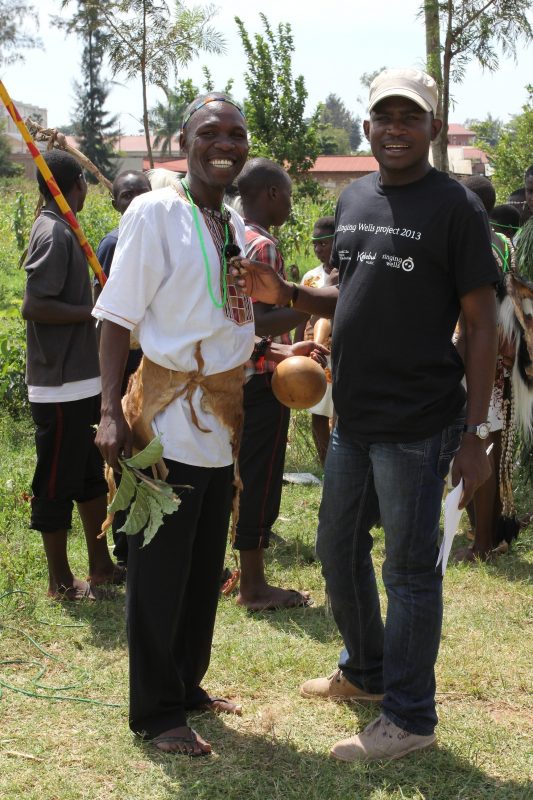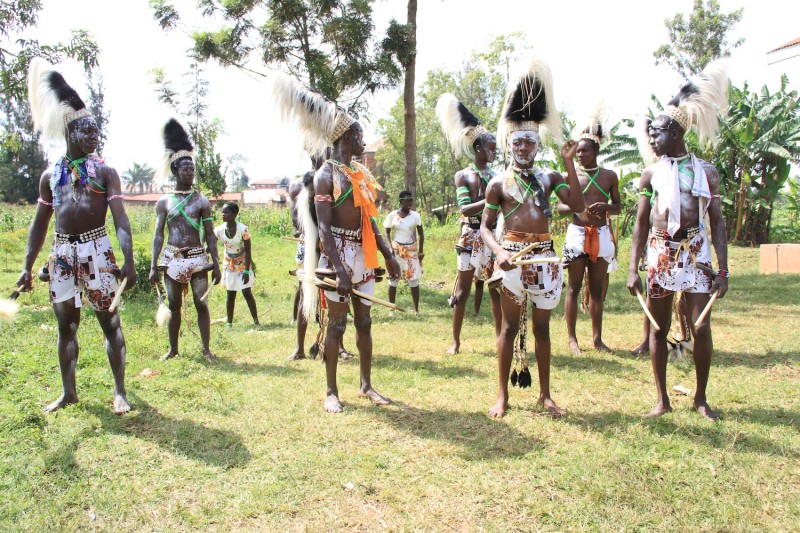
Julius with Nick.
“Our aim is to come out of poverty, using our own skills in music and dancing”. Julius Wilimbwa

Named after the nearby mountain, Mount Elgon and the drum, the Ngoma, The Elgon Ngoma Troupe is led by Wilimbwa Julius. Julius is a member of the Bagisu tribe, who founded it in 2009 as a group for orphans or disadvantaged youths. Julius helps these students develop their natural talents to the next level, in the hope of finding work with their skills.
He struggled through his teens with no support, but found his way gradually as a musical performer, working with the National Theatre and various troupes around Mbale. He was always extremely proud of his tribe, the Bagisu, and always wanted to do something musically building off his own culture. He also wanted to help other kids facing what he faced – either has orphans or from severely disadvantaged homes.
He started to go to University but found that gathering the funds for tuition each time extremely difficult. He had raised the funds for another semester and then asked himself, “Do I want another semester of education, with no promise I will be able to fund another, or can I take this money and start to make a difference?” So he took the money and invested in instruments for children, starting with the Kadodi, the traditional drums of his culture. The Kadodi is made up of a big bass drum, a solo drum played with a stick, a rhythm drum played with hands, a smaller high pitched drum and a shaker.
From two members of his group, they became a band of 12 players. They named themselves the Elgon (the local mountain) Ngoma (generic term for drums) Troupe and starting in 2009 played all sorts of functions that would bring money in to support the band members, all of which live on the premises.
Shortly after, a friend of Julius’s donated some brass instruments and Julius started a brass band, called the Elgon Hero Brass Band. When you combine the two bands, the traditional and the new brass sound, Julius says, they blew audiences’ minds. As the bands have grown there are roughly 160 total members of his group, of which 100 are performers. They are roughly divided between the two bands. For income, they do performances and also work four acres of land to feed themselves. Many of the members also do arts and crafts or a skilled trade – Julius’s dream is to open up a hair and beauty studio so they can support the bride with her beauty and music.
He hopes the troupe will give them opportunities to travel away from their homes, but also to preserve the traditions of Eastern Uganda to the rest of the world.
——–
You can contact Julius at juliuswolimbwa@gmail.com or PO Box 2254 Mbale, Uganda
You can find the Troupe on Facebook here.
You can watch a video about the group here.
Some of the musicians we recorded were:
Bikumbi Yusuf (solo Adungu), Wamumdu Albashir (bass Adungu), Kyasowbayo Joseph (xylophone) and Dkining David (tube fiddle).
The songs played were:
“Isongja”: a pre-circumcision song and dance where boys are challenged to get ready for the ritual.
“Kadodi Imbalu Dance”: this is about the circumcision ritual itself and involves the boy being reluctant and getting help from others to be brave. The song closes with a section about the boy having and surviving the ritual.
“In our tradition, if you are 80 years old and have not gone through the ritual of circumcision, you are not a man and cannot sit at the adult table. If you are a two year old and have been circumcised, for us, you are an adult.” Julius
Ngoma (also called engoma or ng’oma or ingoma) are musical instruments used by certain Bantu populations of Africa. Ngoma is derived fromthe Kongo word for “drum”. Different Bantu-inhabited regions have their own traditions of percussion, with different names for their instruments.
21st November 2013
Recording location:
Elgon Ngoma Troupe Centre, Mbale
Audio by:
Steve Kivutia, Ketebul Music & Andy Patterson, Abubilla Music.
Mixed by Andy Patterson
Video by:
Patrick Ondiek, Ketebul Music; Jimmy Allen and Victoria Denison, Abubilla Music